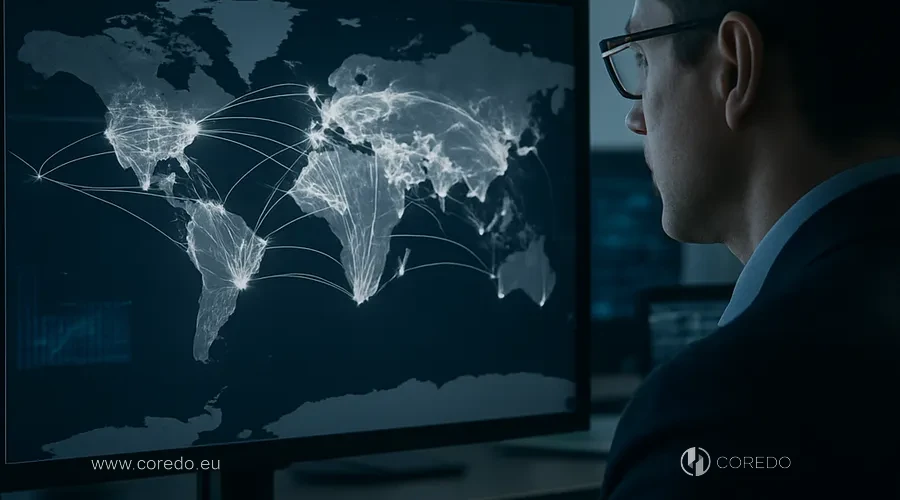In 2024, global business faced an unprecedented rise in financial crime: according to ACAMS, in the EU alone losses from money laundering exceeded €197 billion, and in Asia the number of suspicious transactions increased by 43% year-on-year.
Transactional matching is not just a technological tool, but the strategic foundation of modern corporate security and legal support.
Its implementation is the key to risk management, compliance with international standards, and scaling the business without unexpected obstacles.
In this article I, Nikita Veremeev, CEO COREDO, will examine in detail why transactional matching is critically important for business, how it integrates with AML services and legal support, and what practical steps should be taken to protect and grow your company in the EU, Asia, and Africa. Read to the end; you will receive not only strategic ideas but also concrete recommendations tested by COREDO.
What is transactional matching for business?

Transactional matching for business is about process optimization, where the success of a deal depends on the accuracy and speed of reconciling operations between companies and their customers or partners. Understanding the basics of transactional matching will enable businesses to increase efficiency, reduce costs, and automate key stages of interactions.
Basics of transactional matching
In international business, transactional matching underpins financial transaction monitoring, allowing for transactional control and reduction of operational risks.
COREDO’s practice has shown that proper configuration of transactional matching not only speeds up payment processing but also minimizes the likelihood of accounting errors, especially when working with multiple currencies and jurisdictions. In one case for a client from the Czech Republic, the COREDO team implemented a transaction control system that reduced reconciliation time by 63% and lowered the number of disputed transactions to a statistically insignificant level.
The impact of transactional matching on risk management
It provides early detection of financial crime and fraud, allowing for rapid response to anomalies and suspicious operations. Modern matching systems use machine learning algorithms to analyze big data and detect atypical patterns related to attempts to launder money or finance terrorism.
The solution developed at COREDO for an international group integrated transactional matching with an anomaly monitoring system, which made it possible to detect attempts to split payments and circumvent limits set by regulatory requirements in the EU and Asia. This approach not only reduces the risk of financial losses but also protects the company’s reputation in the global market.
Transactional matching in AML: role and significance
As AML compliance tightens for companies in the EU, Asia, and Africa, transactional matching becomes an integral part of the fight against money laundering. International standards FATF require companies to implement effective AML procedures for business, including automated transaction reconciliation, customer identification (KYC), and monitoring of suspicious operations.
In a case for an Estonian fintech company, the COREDO team implemented a comprehensive AML strategy where transactional matching was integrated with ERP and CRM systems, providing transparency and control at every stage of the financial operation.
Legal support and transactional matching

Legal support ensures the reliability and transparency of all stages of the transactional process, reducing risks and preventing potential conflicts. Transactional matching requires fine legal expertise to protect the interests of the parties and ensure compliance with industry standards.
Legal expertise in transactional matching
Organizing transactional matching is impossible without a deep understanding of the legal aspects of AML and compliance. Legal expertise in AML is necessary for correct interpretation of regulatory requirements, assessment of legal risks, and prevention of liability for AML violations in the EU and Asia.
The COREDO team implemented a project for a British investment company where legal analysis made it possible to identify weaknesses in the transactional control policy and propose adjustments that align with the latest changes in regulatory acts by the FCA and ESMA. Such an approach minimizes legal risks in the absence of transactional matching and ensures business resilience to external audits.
Legal support and LLC registration
Registration of legal entities in the EU and Asia requires not only the preparation of incorporation documents but also the integration of transactional matching into business processes from the company’s first day of operation. Legal support during registrationLegal entities includes analysis of requirements for AML support, the setup of KYC procedures and the implementation of transaction monitoring systems.
In a case for a client starting a business in Singapore, the COREDO team audited regulatory requirements and integrated transaction matching into the corporate structure, which helped avoid delays when opening bank accounts and sped up obtaining financial licenses.
The specifics of AML support when registering legal entities in Africa require consideration of local regulations and international FATF standards, which is especially important when working with cross-border transactions and multi-currency settlements.
The role of a lawyer and a compliance officer in AML and transaction matching
The compliance officer is a key figure in organizing an AML strategy for international business. Their task is to ensure management of corporate risks, transaction monitoring and timely updating of procedures in accordance with changes in legislation.
Automation of transaction matching in AML

Automation of transaction matching in AML is becoming a key condition for effectively combating financial crime today. The development of digital technologies makes it possible to introduce innovative approaches to detecting suspicious transactions and significantly accelerate the analysis of transactions in automatic mode. The following sections examine modern technologies that are shaping the new reality of transaction matching in the AML field.
Transaction matching: modern technologies
Effective transaction matching is impossible without the use of modern technologies. Machine learning algorithms in AML enable automating transaction reconciliation, detecting anomalies and predicting risks. Blockchain technologies in financial control provide immutability of records and transparency of operations, which is especially important for companies working with crypto assets and payment services.
The COREDO team implemented monitoring and anomaly detection systems for clients from Dubai and Slovakia, using hybrid solutions based on artificial intelligence and cloud platforms. This approach makes it possible to process large volumes of data and ensure scalability of AML processes as the business grows.
Integration of transaction matching with AML, KYC, ERP and CRM systems
Integration of AML and ERP systems, as well as automation of customer identification (KYC), are becoming the standard for international companies. AML reporting and audit systems make it possible to form a transparent picture of financial flows and to timely identify suspicious operations.
COREDO’s practice has shown that integrating transaction matching with CRM systems speeds up the onboarding process for new clients, and with ERP provides end-to-end control over all stages of a deal. In a case for a payment provider from Cyprus, the COREDO team implemented a comprehensive integration that reduced the time for compliance checks by 48%.
Automation of legal support: best practices
Digital transformation of legal support is a trend in recent years. AML software and automation of legal support not only reduce costs but also improve the quality of control.
COREDO’s solutions include the implementation of cloud platforms, automated audit and monitoring systems, as well as staff training to work with new technologies. Scaling AML processes becomes possible thanks to the flexible architecture of solutions and the constant updating of algorithms in accordance with changes in regulatory norms.
Transaction matching in the EU, Asia and Africa

Transaction matching is becoming a key tool for transparency and efficiency of financial operations in different regions, including the EU, Asia and Africa. In each region, its implementation and maintenance require strict compliance with local regulatory requirements and compliance standards, which affects the structure and algorithms of matching systems.
Regulatory requirements and compliance by country
International FATF standards define the basic requirements for AML and transaction matching, but each jurisdiction — the EU, Asia, Africa — has its own regulatory specifics. Cross-border regulation and compliance require taking into account local norms, reporting peculiarities and identification procedures.
The COREDO team conducts audits of regulatory requirements for clients entering new markets and develops individual strategies for implementing transaction matching taking into account the specifics of each country.
Transaction matching and AML compliance in the EU
AML compliance for companies in the EU requires a high degree of automation and transparency. Legal risks in the absence of transaction matching in EU companies include account freezes, fines and loss of licenses.
COREDO’s practice confirms that implementing transaction matching into the business processes of companies registering in the EU not only ensures compliance with regulators’ requirements but also significantly accelerates the process of scaling the business.
Scaling and transaction matching in Asia and Africa
Scaling a business through effective transaction matching is the key to success in the markets of Asia and Africa. How does transaction matching help scale a business? By automating transaction reconciliation, integrating with local payment systems and taking into account the specifics of local regulatory requirements.
The COREDO team implemented transaction matching projects for clients from Singapore and South Africa, which significantly reduced the time to adapt processes to new markets and avoid fines for non-compliance with AML standards.
Impact of transaction matching on business and ROI
 transactional matching why it matters for business»” src=”https://coredo.eu/wp-content/uploads/2025/10/VLIIANIE_TRANZAKTSIONNOGO_MATCHINGA_NA_BIZN_H2_IMG_5.webp”/>
transactional matching why it matters for business»” src=”https://coredo.eu/wp-content/uploads/2025/10/VLIIANIE_TRANZAKTSIONNOGO_MATCHINGA_NA_BIZN_H2_IMG_5.webp”/>
Transactional matching plays a key role in the modern business environment, directly affecting process efficiency and ROI metrics. Properly designed transaction matching mechanisms not only increase operational transparency but also significantly reduce costs and risks for businesses.
How does transactional matching improve ROI in AML and legal practice?
The impact of transactional matching on companies’ ROI is clear: reduced operating expenses, fewer errors, faster payment processing and lower risks of financial crime. AML and transactional matching performance metrics include reconciliation speed, number of detected anomalies, response time to suspicious transactions and level of regulatory compliance.
Measuring effectiveness: metrics and KPIs
ROI and KPI metrics for transactional matching include:
- Share of automated reconciliations
- Transaction processing time
- Number of detected suspicious transactions
- Level of AML compliance
- Reduction in errors and disputed transactions
AML audit and reviews allow regular evaluation of the effectiveness of implemented solutions and adjustment of processes in line with changes in legislation.
Thus, regular AML audits ensure not only quality control of transactional matching but also form the basis for sustainable system development in the long term.
Long-term consequences of ignoring transactional matching
Ignoring transactional matching leads to legal risks of AML non-compliance, account freezes, fines and loss of business reputation. Long-term consequences for businesses include reduced investment attractiveness, limited access to international markets and increased costs to restore processes.
Implementing transactional matching into business processes
Implementing transactional matching into business processes opens up new opportunities for automation, increased transparency and internal control within the company. This approach not only improves the efficiency of individual operation stages but also allows integration of modern tools — for example, those related to AML and legal support — into the company’s regular working structure.
Integrating transactional matching with AML and legal support
- Audit current business processes and identify risk points
- Select the appropriate technology for matching automation
- Integrate transactional matching with AML systems and legal support
- Train staff to work with the new tools
- Set up regular AML audits and performance monitoring
The COREDO team implemented similar steps for clients from Estonia and the United Kingdom, ensuring rapid deployment of solutions and risk minimization.
How to minimize risks and comply with jurisdiction requirements
- Take into account international regulation of financial operations and local rules
- Implement a risk-based approach to AML
- Use anomaly detection systems and automated reports
- Engage legal advisors to analyze new requirements
The solution developed by COREDO for a client from Slovakia included integrating AML compliance for companies, taking into account changes in FATF recommendations and local regulatory acts.
Choosing technologies and partners for matching automation
- Evaluate AML software by scalability, flexibility and standards compliance
- Choose partners with proven expertise in international legal support
- Integrate solutions with ERP, CRM and payment systems for end-to-end control
The role of a legal consultant in AML and transactional matching: ensuring processes comply with regulatory requirements and protecting business interests.
Key takeaways and practical steps for business
Transactional matching is a strategic tool for legal support and AML compliance that provides transparency, security and efficiency for businesses in the EU, Asia and Africa. Implementing modern technologies and integrating them with legal and financial processes allows companies not only to meet regulatory requirements but also to gain competitive advantages.
I recommend that entrepreneurs and managers start with an audit of current processes, choose reliable partners and use modern AML technologies to scale the business without limitations.
Table of keywords by section:
| Section | Main keywords (High, Medium, Low) |
|---|---|
| Introduction | transactional matching, transactional matching for business, the importance of transactional matching in business |
| What is transactional matching | transactional matching, transactional control, AML services, AML compliance for companies, prevention of financial risks |
| Legal support | legal support for companies, legal support during registration of legal entities, legal aspects in the EU and Asia |
| Technologies and automation | integration of AML systems with transactional matching, machine learning algorithms in AML, automation of legal support |
| International context | registration of legal entities in the EU, company registration in Asia, features of AML support when registering in Africa |
| ROI and effectiveness | impact of transactional matching on companies’ ROI, ROI metrics, legal risks of non-compliance with AML |
| Practical recommendations | best practices of transactional matching for international business, how to implement transactional matchingg, AML compliance |